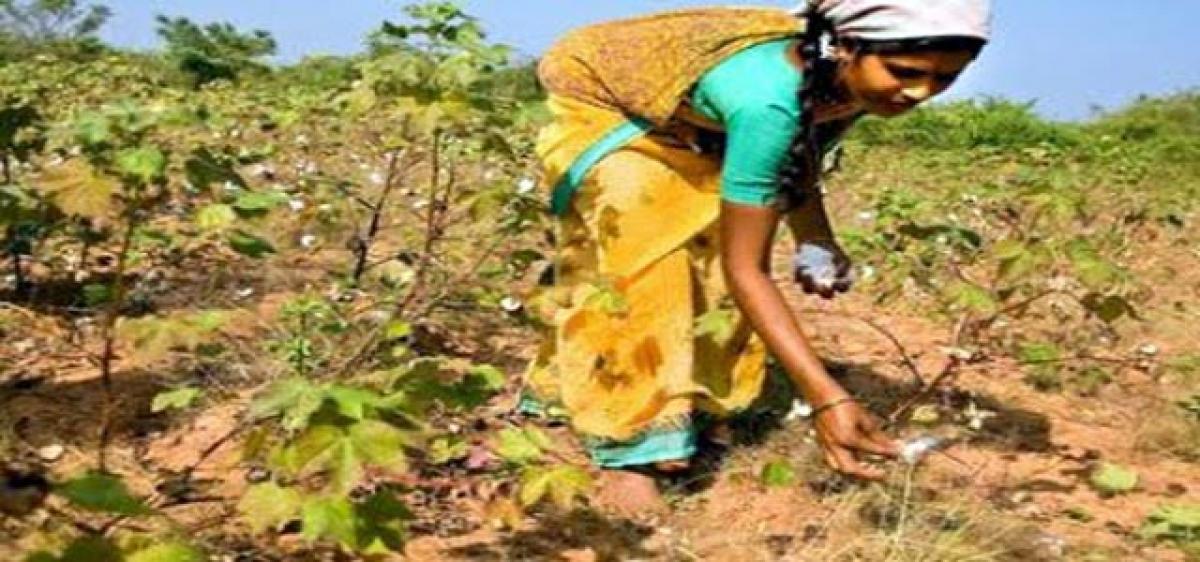Live
- Stokes motivates his team to put in extra effort, says England pacer Potts
- From overcoming setbacks to leading India in U19 Women’s Asia Cup, Niki Prasad's amazing journey
- Constitution debate: PM Modi hails 'Nari Shakti'; makes strong pitch for 'United Bharat’
- Bihar: Inquiry initiated against principal who went to buy veggies during school hours
- TN: DMK postpones executive meet due to heavy rains & Parliament session
- Porous silicon oxide electrodes can fix durability issues in batteries: Researchers
- Jalandhar civic polls: AAP promises launch of 100 e-buses, round the clock water supply
- Economic upliftment of rural women is priority of Tripura govt: CM Saha
- Rajmata Jijabai Trophy: Manipur move to top of the table, T.N register first win
- Italian envoy Baroli hoping to strengthen ties with India through football
Just In

Most of the farmers in this era of intensive agriculture are tuned to crave for new crop varieties or hybrids. Of late, Telangana and Andhra Pradesh have become important centres of seed production.
Most of the farmers in this era of intensive agriculture are tuned to crave for new crop varieties or hybrids. Of late, Telangana and Andhra Pradesh have become important centres of seed production. Crops like cotton, maize, sorghum, bajra, sunflower, castor, vegetables gained momentum in seed production after the advent of hybrid technologies. However, Bt cotton hybrid seeds dominate the scene. The short-sighted approach of their cost and agro-ecology boomeranged, in terms of legal fights with monopoly trade.
Recently, seeds of dry chillies gained momentum because of better market price and higher output. The area of chillies crop was concentrated in combined AP, where more than 70 per cent of the total produce of the country was obtained, in general. The abnormal propaganda adopted by seed producing agents, evidenced in emergence of several new companies and individuals in addition to the existing groups in seed sector, boosted the area of this crop in both the states.
Now, chilli growers are in disarray and disappointment due to inclement weather and option of inappropriate varieties/hybrids. In around 60,000 acres, this year, the crop failed due to spurious seeds as per records. Many of such farmers who were misled by companies and opted for high cost hybrids are in the streets and are demanding compensation. Though such situations were not uncommon in these two states, the utter failure of government in regulating this unorganised seed trade and anarchy attitude of middle-men involved in large-scale has come to surface.
Here in seeds, the term spurious is widely used to refer to non-branded varieties/hybrids and uncrossed varieties marked as hybrids, besides imitations or duplicate hybrids/varieties of licensed or recognised companies. In this era of intellectual property rights, major seed companies claim that theirs are original brands while the unlicensed individually produced seeds are dubbed duplicate.
The entry of hybrids in terms of heterosis breeding in maize like cross- pollinated food crops and cotton like often cross-polinated crops established scope for seed improvemet. Though hybrid rice production opened doors for exploitation of heterosis breeding in self–pollinated crops also, it did not gain much success except in China. Similarly, there were several limitations to exploit this method of seed production in chillies like crop, which is predominantly a self-pollinated one.
Public institutes established that, since there was marginal difference in yield potential of hybrid and varieties in chillies, there is no use investing in hybrids. However, private agencies were successful in creating hybrid mania in chillies crop growers also, by manipulating the outputs and masking the negative sides. Naturally, all the seed companies entered this trade, which was least monitored by public institutes. Guntur, connected with Bangalore and Hyderabad, has become the hub of seed companies, ultimately leading to spurious seeds in chillies also.
Though there were many instances that exposed the supply of poor quality or spurious seeds in rice, maize, cotton and chillies by several reputed local and multinational companies, they were rarely made to compensate for their misdeeds and loss caused to the farmers. Witnessing this, several individuals and other non-agro-input trade companies also entered the field and started exploiting the situation. Many companies have minted money and become super rich by misleading farmers in the name of new hybrids and miracle seeds.
The failure of government to activate regulatory bodies and strengthen public institutes has left farmers in the lurch. Various expert committees have stressed on the role of policy-makers and the government to take care of seed sector. Several guidelines including seed village and producers cooperatives’ concepts and amending seed laws in favour of main stake holders, besides strengthening crop insurance against non-certified seeds were put forth by those experts. However, very little attention was paid to them. It is time to introspect and restore credibility of seed sector, the base for better production. (Writer is Convener, Rythu Rakshana Vedika, Guntur)
By Prof N Venugopal Rao

© 2024 Hyderabad Media House Limited/The Hans India. All rights reserved. Powered by hocalwire.com







